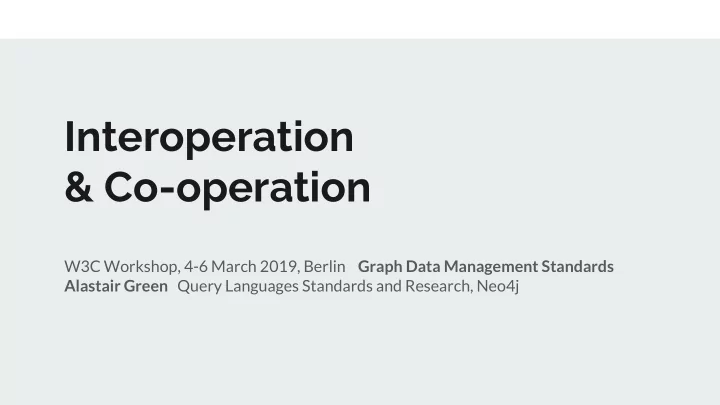

Interoperation & Co-operation W3C Workshop, 4-6 March 2019, Berlin Graph Data Management Standards Alastair Green Query Languages Standards and Research, Neo4j
Like poles repel Two 300kg pull power magnets cannot be forced together by the weight of a man
Like poles repel Two 300kg Three large pull power software magnets vendors cannot be found it hard to forced together agree on how to by weight of handle XML in SQL a man
Like poles repel Two 300kg RDF pull power openCypher magnets SQL/PGQ cannot be PGQL forced together G-CORE by weight of Gremlin a man
Creating Useable effective Adopted software Uncontested standards is hard
Useable Sufficient features Fit requirements Ergonomic for users Fit for implementation
Adopted Timely Community Accessible But above all ...
Uncontested Just the one
Just the one, Domain for each ... Community
Why do data Data model communities arise? Uses of data
RDF SQL Tabular Labelled Document Property Graph
Traversals DeclarativeQ Algorithms Gremlin ueries Results Schema Interchange GraphQL
Domain standards Data communities are and interchange not islands standards Users either want or have to deal with multiple models and uses
Bridging An opportunity to SQL, RDF create co-operative & Property Graphs approaches to interoperation in graph data management
Minimal Each community has to Interoperation gets its house in order Property graph world seems to lag the RDF world in this respect “GQL face-to-face”
In theory . . . SQL could be extended to do everything for graphs SPARQL could be extended to do everything for PG and tables A property graph GQL that handles tables and graphs could do everything SQL can do
In practice . . . That would lead to paralysis, or endless war Data communities have very deep social and product roots, and large to huge user bases Like humans, they can’t get personality transplants
In practice . . . That would lead to paralysis, or endless war Data communities have very deep social and product roots, and large to huge user bases Like humans, they can’t get personality transplants
Co-operate SQL/PGQ to define SQL-GQL shared substrate reasonable sparql-gremlin + CfoG interoperation GQL-SPARQL* views standards role of graph typing data interchange
GQL SQL FROM sn MATCH SELECT gt.p1, gt.p2 RETURN n.p1, e.p2 FROM GRAPH_TABLE( ) gt
SQL GQL scalar datatypes expressions tabular post-project clauses catalog authN model ...
SPARQL Cypher Gremlin
SPARQL* named query GQL FROM sfoo MATCH sfoo # that can CONSTRUCT
Graph program Query Imperative/Traversal Compute
X-model Data interchange Graph Schema/Type PG RDF
Co-operate to define reasonable interoperation standards
Recommend
More recommend